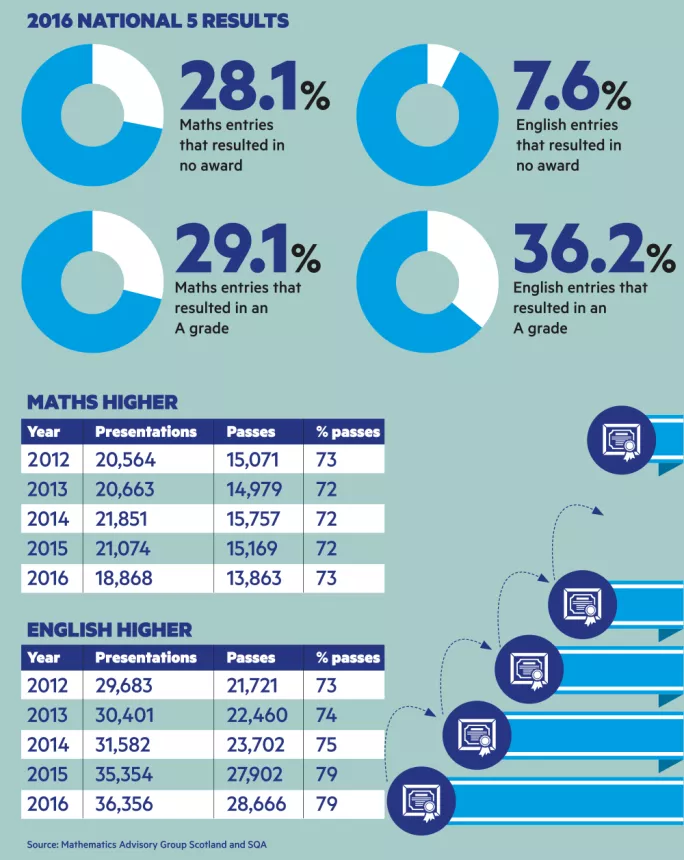‘Demoralising’ maths exam reform harming the subject

Maths teachers have issued a stark warning to the government that changes to qualifications are making it harder for pupils to pass courses and have left staff feeling “demoralised”.
The concerns, which centre on National and Higher qualifications, are set out in a letter to education secretary John Swinney from the Mathematics Advisory Group Scotland (MAGS), seen by TESS.
In many cases, pupils “cannot achieve [N5] mathematics while they can achieve [N5] in many other subjects”
Teachers feel that there is “too big a gap” between N4 and N5 maths, compared with their equivalent levels in the now-defunct Standard Grade qualification, the letter says. This “excludes hard-working candidates” who want to improve their maths skills but struggle with N5; only about two-thirds of the number completing N5 English gain an N5 in maths.
In many cases, pupils “cannot achieve [N5] mathematics while they can achieve [N5] in many other subjects”, says the letter, which has also been sent to unions and the Scottish Qualifications Authority (SQA).
More than a quarter of N5 maths entries last year resulted in no award, compared with 8 per cent of English entries. Maths represented 29 per cent of “no awards” from all 48 National 5 subjects.
The removal of unit assessments across all subjects at N5 from 2017-18 - a move announced by Mr Swinney last year in response to teaching unions’ concerns about workload - will only make matters worse, warns the letter.
The group predicts that changes being brought in to compensate for the loss of unit assessments could result in an even harder N5 exam. It says: “The more able learner will benefit without unit assessments with more time…spent on learning and teaching.”
‘Bad press’ for maths
But borderline N5 pupils face extra work “to ensure some level of certification” - resulting in “less teaching time for those who need it most”, it adds.
Higher maths, meanwhile, has suffered from “a bad press”, especially after SQA chief executive Janet Brown admitted at a parliamentary committee in 2015 that the exam had been too hard.
A perception is growing in schools that pupils can achieve better grades by taking “easier” subjects, which has left teachers “demoralised”, according to the group.
Teachers see a “lack of equality” between maths and those subjects that award more marks for work completed during the course, putting “additional stress” on pupils sitting maths exams.
The letter also reports that pupils neglect maths study because they are “overwhelmed” by the course requirements of other subjects.
The number of pupils taking Higher maths fell by nearly 14 per cent between 2014 and 2016 and pass rates have changed little. Meanwhile, the number of English candidates has jumped 22 per cent since 2012; pass rates have improved by 6 percentage points.

MAGS - which represents all levels of school maths education - wants the SQA and the Scottish government to take urgent action to address an “inequality of opportunity”.
Billy Burke, headteacher at Renfrew High School and a member of the national Making Maths Count group that published a major report last year (see box, left), said: “[The] attitude and mindset towards maths in society and in individual learners is less positive than other subject areas.
“Some very positive work is being done around the country to support teachers to develop teaching and learning approaches that support this and will have a positive impact through time.”
But secondary teachers were “understandably concerned about the forthcoming changes to National courses, which risk making attainment in maths even more about high-stakes external exams”, he added.
One east of Scotland maths teacher, who asked not to be named, told TESS: “We are heading to an N5 with no compensatory N4 - no safety net. That will mean we need to give all N5 pupils the N4 course assessments alongside the N5 work.
“How will that not add to our work or lengthen an already overfilled course?”
Inequality of opportunity
The teacher said “the real victims” were pupils whose futures would be “in tatters” having failed to achieve an adequate maths grade. “When you hear that a kid is rejected from a bricklayers’ college course because they can’t get National 4 maths, [it] seems random to put these demands on,” he added.
When you hear that a kid is rejected from a bricklayers’ college course because they can’t get National 4 maths, [it] seems random to put these demands on
A spokesman for the SQA said: “We welcome and regularly seek the views of teachers, lecturers and subject groups.” The SQA had asked the Scottish Mathematical Council, along with MAGS, to join its national qualification support team.
The spokesman said N5 and Higher Maths were “within the parameters of difficulty which we would expect for subjects at these levels”. The perception of maths being more difficult than other subjects was also affected by learning and teaching methodology, the level of attainment from pupils’ “broad general education” and the allocation of teaching time to maths courses, he added.
A Scottish government spokesman said: “We will always listen to the views of teachers and the changes to the qualifications represent a considerable reduction in teacher workload. Thousands of professionals were involved in the development and refinement of the national qualifications, including maths teachers.
“The Scottish government, SQA and Education Scotland continue to work with them, to ensure that our young people have the best possible opportunities to attain to the highest level possible.”
You need a Tes subscription to read this article
Subscribe now to read this article and get other subscriber-only content:
- Unlimited access to all Tes magazine content
- Exclusive subscriber-only stories
- Award-winning email newsletters
Already a subscriber? Log in
You need a subscription to read this article
Subscribe now to read this article and get other subscriber-only content, including:
- Unlimited access to all Tes magazine content
- Exclusive subscriber-only stories
- Award-winning email newsletters